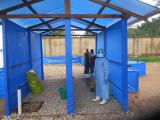A Minnesota man who recently returned from a trip to West Africa is being treated for the viral disease Lassa fever, marking the first US case since 2010, Minnesota and federal officials announced today.
The man is hospitalized in stable condition and is recovering, the Minnesota Department of Health (MDH) and the Centers for Disease Control and Prevention (CDC) said in statements. They said the disease does not spread through casual contact, but they are working to identify and notify airline passengers and others who may have had contact with the patient.
In West Africa, Lassa virus is carried by rodents and spreads to humans through contact with rodent urine or droppings, the health agencies said. In rare cases it can spread from person to person through direct contact with a sick person's blood or bodily fluids, through mucous membranes, or through sexual contact. West Africa has about 100,000 to 300,000 cases of Lassa fever and 5,000 deaths each year.
The MDH said the patient was sick with fever and confusion when he arrived in Minneapolis-St. Paul on Mar 31. A physician who examined him shortly after his arrival suspected a possible hemorrhagic fever and reported the illness to the MDH. Blood samples were submitted to the CDC, and they tested positive yesterday. The MDH did not disclose the man's name and city or the admitting hospital.
"The hospital has done an excellent job of caring for the patient and taking all necessary measures to ensure the safety and protection of hospital staff, visitors and patients," Ed Ehlinger, MD, MSPH, Minnesota commissioner of health, said in the MDH statement.
The CDC said it was working to determine the patient's travel route from West Africa and identify fellow passengers. Preliminary information indicates that he flew from West Africa to New York City and caught another flight to Minneapolis.
"Given what we know about how Lassa virus is spread to people, the risk to other travelers and members of the public is extremely low," said Martin Cetron, MD, MPH, director of the CDC's Division of Global Migration and Quarantine.
Seven other Lassa fever cases, all travel-related, have been identified in the United States, the last one in Pennsylvania in 2010, the CDC reported. Although Lassa fever can produce hemorrhagic symptoms, the disease is not related to Ebola virus disease, an outbreak of which is currently ongoing in Guinea and neighboring West African countries.
The MDH said 80% of people infected with Lassa virus don't show any symptoms.
See also:
Apr 4 MDH press release
Apr 4 CDC press release




















